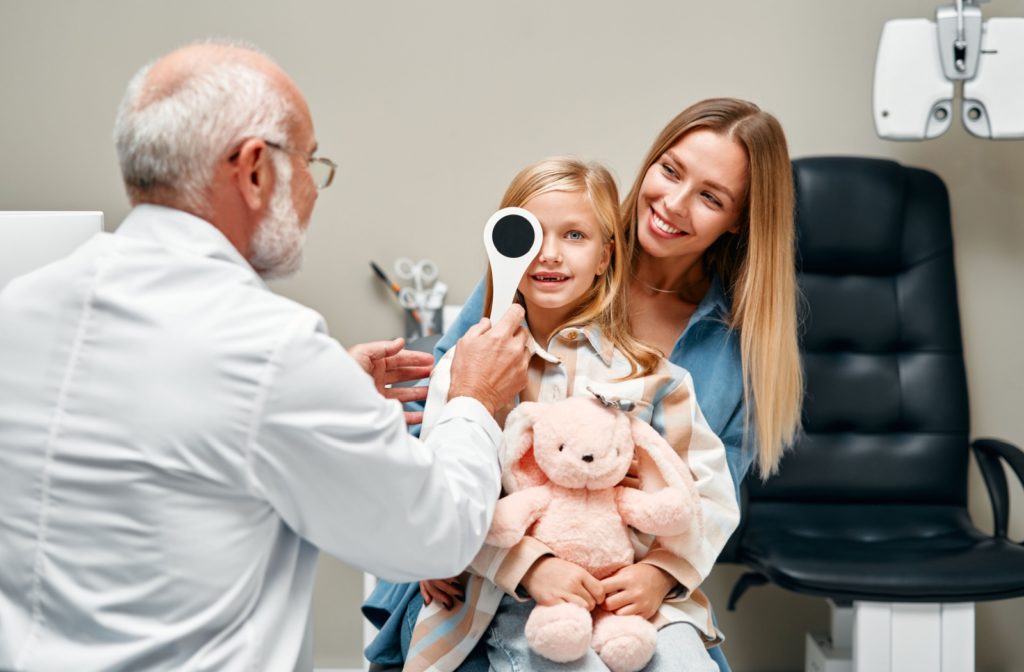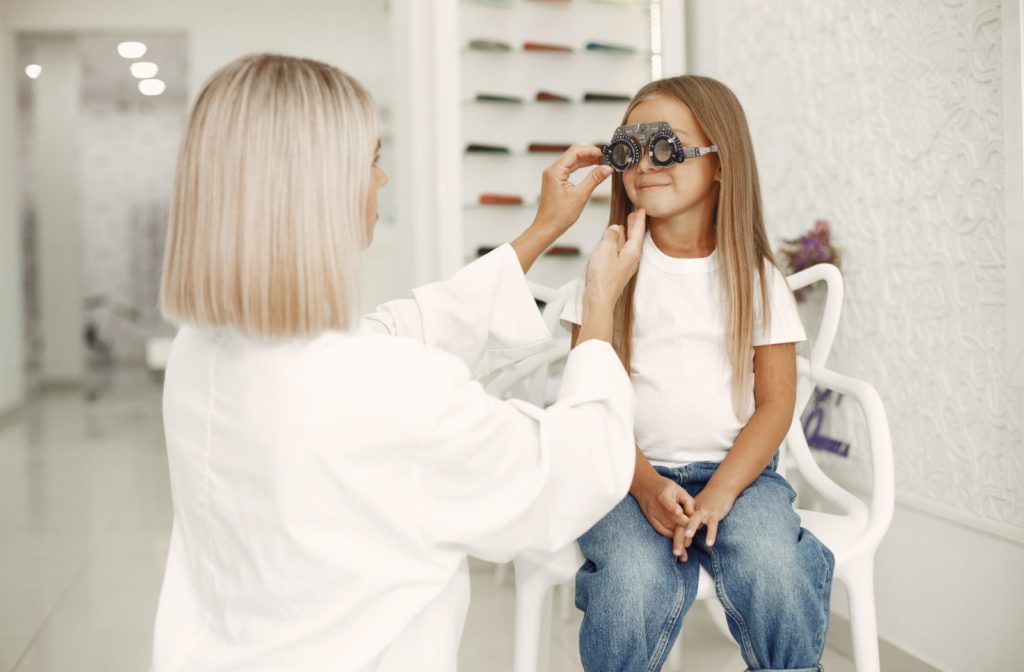Taking care of your family’s health is a top priority, but did you know regular eye exams are as important as routine physical check-ups? If scheduling an eye exam makes you wonder what it entails or how much time it will take out of your busy day, we’re here to help.
A regular comprehensive eye exam typically takes 30-60 minutes. Still, it can vary depending on whether it’s your first visit to the office, whether you’ve had any updates to your medical history, or whether you need prescription updates.
What is a Comprehensive Eye Exam?
A comprehensive eye exam is a detailed evaluation of your vision and overall eye health. Unlike a quick vision screening (like those conducted at schools), this exam provides a thorough assessment of your eyesight and a detailed check-up on your eye health.
An optometrist uses a combination of questions, tests, and tools to look for issues such as nearsightedness, farsightedness, astigmatism, or even early signs of eye diseases like glaucoma or cataracts. A comprehensive eye exam is not just about getting a new prescription for glasses or contacts. It’s a proactive step toward protecting your vision and overall health.
What Happens During an Eye Exam?
Eye exams are structured and cover several steps to ensure your vision and eye health are thoroughly evaluated.
- Patient history: Your optometrist will begin by asking about your medical history, including any current vision problems, past eye injuries, or family history of eye diseases. For children, you’ll also be asked about their birth history and developmental milestones.
- Visual acuity test: This is where the classic eye chart comes into play. The optometrist tests how well you can see near and far to assess your vision clarity.
- Refraction test: Your optometrist determines the right prescription for glasses or contact lenses using a special tool called a phoropter. They’ll ask which lens options (“1 or 2”) seem clearer to find the perfect corrective strength.
- Eye health evaluation: This step includes examining the front and back of the eye with tools like a slit lamp and ophthalmoscope. Your doctor may dilate your pupils with special drops to better view the retina, optic nerve, and blood vessels.
- Eye coordination and muscle testing: Your optometrist will assess how well your eyes work together, testing eye alignment and focusing ability—which are especially important in children.
- Tests for eye pressure: A quick puff of air or a small probe will measure the pressure inside your eye to screen for glaucoma or other issues.
How Long Does a Comprehensive Eye Exam Take?
Typically, a comprehensive eye exam takes about 30 to 60 minutes. The exact length depends on factors like your age, whether it’s your first visit and the complexity of your case.
For young children, or if it’s been years since your last check-up, the exam might include additional steps, and your optometrist will take extra time to make your little one feel at ease. If pupil dilation is required, this may add approximately 15 to 30 minutes while the drops take effect.
Even though the process is thorough, rest assured it’s time well spent to ensure you and your family maintain optimal vision and eye health.
How Often Do I Need an Eye Exam?
The frequency of eye exams can vary depending on your age, health history, and whether you wear glasses or contact lenses. Here’s a general guideline recommended by experts:
- Children (6 months—5 years): The first exam is at 6 months, then again at age three and before starting school.
- Children (6–18 years): Every 1–2 years or as recommended.
- Adults (18–60 years): Every two years, unless you experience vision changes or have risk factors for eye disease.
- Seniors (60+ years): As people age, their risk for conditions like cataracts or macular degeneration increases annually.
What Can an Eye Exam Diagnose?
An eye exam doesn’t just check whether you need glasses—it can reveal much more. Some conditions your optometrist can detect include:
- Refractive errors: Nearsightedness (myopia), farsightedness (hyperopia), and astigmatism.
- Eye diseases: Glaucoma, cataracts, macular degeneration, and diabetic retinopathy.
- Systemic health issues: High blood pressure, diabetes, and even early signs of neurological conditions like multiple sclerosis.
The earlier these conditions are detected, the more effective treatment can be.
The Importance of Regular Eye Exams
Regular eye exams are essential for both children and adults. They help maintain clear vision and detect potential issues before they become serious problems. Vision problems can impact learning, coordination, and social development in children. Early detection of eye conditions for adults can preserve sight and even catch warning signs of general health concerns.
Don’t wait for noticeable symptoms to schedule an eye exam—many eye diseases are asymptomatic in their early stages.

How to Prepare for Your Appointment
To make the most of your eye exam, follow these easy preparation tips:
- Bring Your Eyewear: Bring your current glasses or contact lenses to the appointment.
- List Your Medications: Write down any medications or supplements you’re taking.
- Note Your Symptoms: Jot down any vision changes or eye discomfort
- Know Your Family History: Share any history of eye diseases or conditions.
- Prepare Your Child (if applicable): Talk to your child about what to expect to ease anxiety.
Arriving prepared helps your optometrist provide the most accurate and thorough assessment.
Total Vision Carlsbad Plaza knows that regular eye exams invest in your family’s health and well-being and that knowing what to expect can make the whole process smooth and stress-free. Contact us today to schedule your next comprehensive eye exam.



